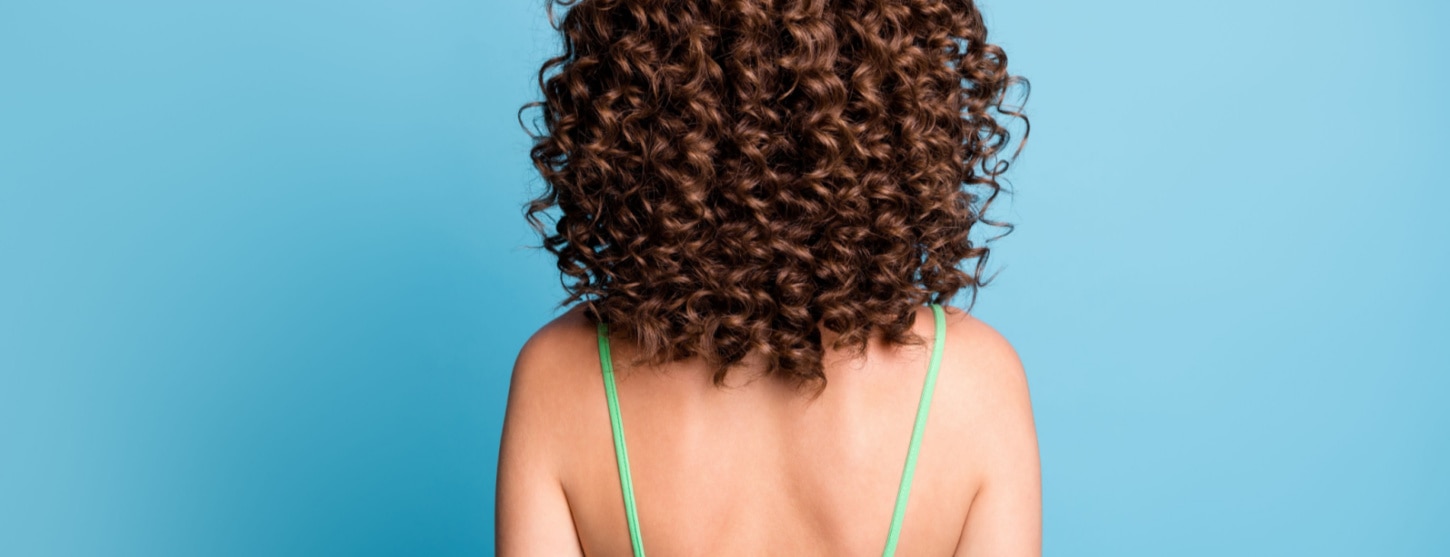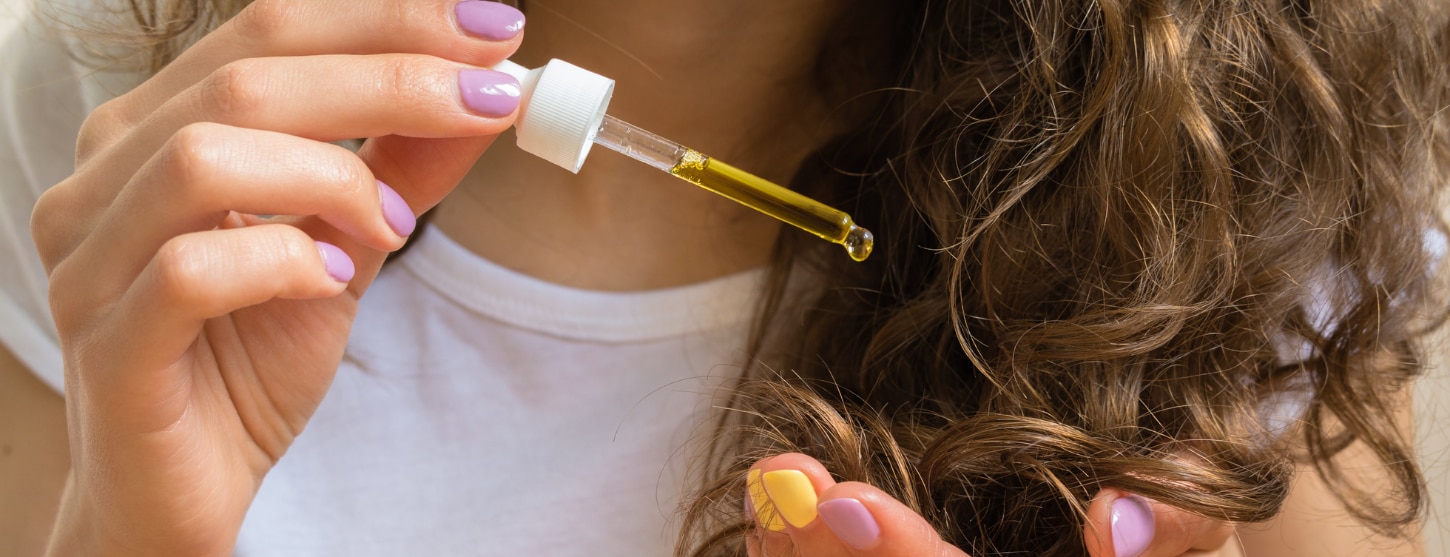20% off €35
Ingredients to avoid for curly hair

Curly hair is a little more fragile than straighter hair types and requires a little extra care. So, whether you have short curly hair, afro hair or long wavy hair, knowing how to look after your curls properly is key to keeping them healthy and luscious.
There are many hair care products on the market, but some may actually damage your curls. Many products include surfactants, formaldehyde and artificial fragrances that sometimes cause scalp irritation, dryness, and frizz.
These ingredients, along with others, can lead to damage, so it’s important to know what to look for on labels.
Cutting out these ingredients completely, as shown through the Curly Girl Method, can improve the condition of your curls, but starting small and swapping out some products can be really beneficial too.1
For healthy hair, here are some of the most common offenders you may wish to avoid.
Skip to:
Surfactants
An ingredient usually found in shampoo is surfactants, a chemical detergent that creates a rich lather when washing your hair. They break down the oils and impurities on the scalp and hair. 2
Many people associate the sudsy lather when shampooing with clean hair, but surfactants can strip natural oils and moisture from your hair. For curly hair types, this can leave your curls dry, frizzy, and prone to breakage.
As a harsh ingredient, surfactants can also contribute to scalp irritation, sometimes leading to itchiness and even dandruff.
Instead, opt for products that are formulated without surfactants or if you are feeling really ambitious, you could even follow the “no poo” routine of avoiding shampoo altogether!
Silicones
Silicones are a group of synthetic ingredients often found in many conditioning treatments.
Conditioners and leave-in products include silicones to make the hair appear shinier, softer and smoother. In addition, they coat the hair to prevent moisture from entering and exiting the hair strand. 4
Silicones can at first provide some benefit by locking in moisture and helping to prevent frizz. However, with frequent usage, they can build up on the hair over time, causing it to become dull and lifeless.
For curly hair types, a build-up of silicones can weigh down your curls and make them look greasy.
As silicones build up over time, it can also be challenging to cleanse your hair properly. To remedy this, try using a clarifying shampoo once a week in your hair care routine to remove any build-up of silicones.
Alcohol
Alcohol is a really common ingredient, often used as a drying agent or a carrier, that can be damaging for curly hair.
There are different types of alcohol used in curly hair products. Typically, these ingredients are used to help dissolve other ingredients; however, they can also have a drying and irritating effect, leading to frizzy curls.
Some alcohols can also act as a solvent, which can strip your hair of its natural oils.
Haircare products often include alcohol as a drying agent. While they may make your hair appear temporarily sleeker, they can damage the cuticle over time and lead to breakage.
Formaldehyde
Formaldehyde is a preservative ingredient used in hair products. For those with curly hair, formaldehyde has known to be incredibly damaging as it can cause sensitivity to the scalp, leading to dry and frizzy curls. 5
To keep your curly hair healthy and hydrated, avoiding products that contain this ingredient may help.
There are plenty of other safe and effective options on the market that will help nourish and protect your locks.
Artificial Fragrance
Synthetic fragrances are found in many personal care products, including shampoos, conditioners, and styling products. Whilst they give products a delightful scent, unfortunately, they can sometimes irritate the scalp and even trigger allergies for some people. 6
An irritated scalp can result in unhealthy hair, dandruff, itchiness, and hair loss and for fragile wavy or curly hair, irritation can lead to extensive damage.
Opting for fragrance-free products or those with a natural scent will help keep your curls nourished and healthy.
Dyes
Dyes can be harsh on curly hair, causing it to become dry and brittle.
Many hair dyes contain harsh ingredients that strip away natural oils, damage the hair shaft, and irritate the scalp. Regular hair dyes can result in dry and frizzy curls for curly hair types.
Look for dyes without ingredients like ammonia and peroxide, two particularly harsh ingredients that can damage your curls.
Instead, opt for curly-friendly or natural hair dyes that will help protect your hair from damage and follow up with a deep conditioning treatment.
Petroleum
Petroleum is frequently used in haircare products, but it can also be harmful to curly hair. Petroleum coats the hair shaft and prevents moisture from penetrating the hair, leading to dry, brittle and frizzy curls. 7
Like silicones, petroleum can build up over time and be difficult to remove. It can sit on the scalp, causing sensitivity and dandruff, whilst also creating a barrier on the hair shaft. This barrier that petroleum will build-up, preventing moisture from getting to the hair.
The final say
So, if you have found that your curls have been looking a little lacklustre recently, maybe try excluding the above ingredients from your haircare and see if you notice a difference!
You just need to find out what works for you, and understanding what ingredients go into your haircare will enable you to make an educated, personal decision on what suits you best.
Finding out what makes your curls soft, healthy and looking good may take a bit of trial and error, but we recommend starting this journey by reading the labels and opting for products designed for curly hair.
Remember: what works for one person may not work for you. That might mean adopting a ‘modified’ curly hair routine that mainly eliminates the ingredients discussed in this article or maybe going full Curly Girl Method and removing them completely. 1
The advice in this article is for information only and should not replace medical care. Please check with your GP or healthcare professional before trying any supplements, treatments or remedies. Food supplements must not be used as a substitute for a varied and balanced diet and a healthy lifestyle.
Last updated: 15 August 2022
- https://www.naturallycurly.com/curlreading/no-poo/the-curly-girl-method-for-coily-hair
- https://www.ncbi.nlm.nih.gov/pmc/articles/PMC4158629/
- https://www.ncbi.nlm.nih.gov/pmc/articles/PMC3016930/
- https://www.health.harvard.edu/staying-healthy/moisturizers-do-they-work
- https://www.ncbi.nlm.nih.gov/pmc/articles/PMC4560533/
- https://www.ncbi.nlm.nih.gov/pmc/articles/PMC4908932/
- https://www.healthline.com/health/mineral-oil-for-hair



